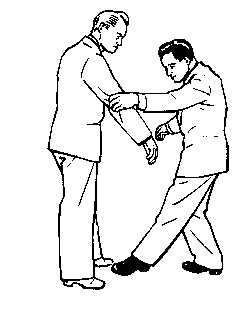 The mat is a place to create opportunities and see possibilities, facing and overcoming one's limitations. Randori (free practice) is the primary method of learning the many lessons of Judo. After teaching Judo for over 30 years I have found that I am saying some of the same things to each generation of students. These are the same key principles that my teachers have told me as they observed my practice. They are the sort of things that most students need to be reminded of. They are easier said than done, but here is a list of the most common advice I give to students to help them with their Judo randori. Of course there are exceptions to every rule and these principles don't apply to every situation. - There is no winner or loser in randori, so focus on attacking freely without regard for being thrown.
- Relax and retain free movement of your body and mind. Keep your arms loose.
- Hold on lightly, but don't let go.
- Follow through with each technique. Don't get in the habit of going in half way.
- Follow-up each technique with another.
- Never refuse a practice partner. Seek out those partners who are better than you.
- Try new tricks.
- Keep the balls of your feet on the mat.
- Kiai for extra power.
- Keep control of your breathing.
- Keep your elbows close to your body where they are more powerful.
- Always face your opponent, never turn your back.
- Don't cross your feet.
- Get the strongest grip you can, but get a grip.
- Learn to feel your partner's intentions and anticipate attacks.
- Keep your head up and centered over your hips.
- Focus on kuzushi, breaking balance, to create opportunities for attacks.
- When attacking get low, turn your head in the direction you are throwing, and rotate the body.
- Keep in mind the principle of mutual welfare and benefit. Help your partner to learn while perfecting your technique.
- Act now; think and analyze later.
- Learn to control your body, your emotions and your mind. Then learn to do the same to your opponent.
- Don't cry, don't make excuses, don't give up. Tomorrow you will be better.
Three methods of practicing with other judoka (from Contest Judo by Saburo Matsushita and Warwick Stepto, 1961). - Practice with inferiors: "You should be trying to throw new throws and develop your secondary techniques when you practice with lower grades." "You can try new combination techniques or opposite-side throws…" Never practice your tokui-waza with a beginner, for you will "blunt it and spoil it".
- Practice with equals: "The first tendency is for the practice to develop into contest. You should try to prevent this in your Randori practice. You must not adopt a defensive posture which might be justified in contest; instead attack with your best throws, as strongly and as quickly as possible." The main point here is to "play constructive judo, and not risk injury to save a point at all costs. Really, you have nothing to lose and should try to move more lightly and faster than you would in contest, in order to increase the speed and strength or your attack."
- Practice with superiors: "In general, you should attack all the time. It is wasting everybody's time to take up a contest attitude against a much higher grade. Attack with all your heart and soul many, many times, and do not wait for a higher grade to attack. A much more skilled man, is not interested in throwing you many times, he wants you to attack, and afterwards he can give you advice on how to improve your methods… Normally, you wait for the higher grade to decide when to end the practice."
|


